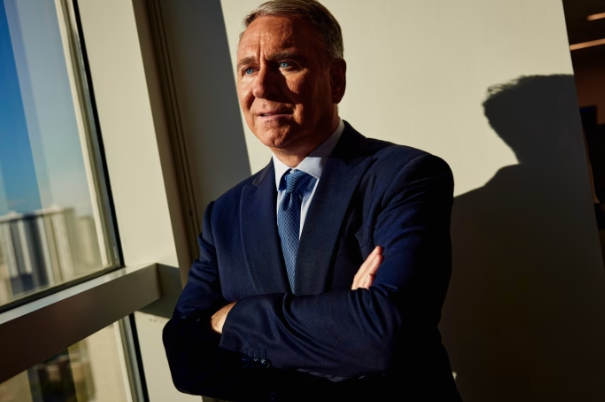
Recently, the global hedge fund industry has been embroiled in a heated debate about the independence of the Federal Reserve. Industry leaders, such as Ken Griffin, founder of Citadel Investments, have publicly criticized Trump's pressure on the Fed, warning that political interference could trigger economic turmoil. This debate not only reflects the financial elite's deep anxiety about policy stability but also reveals how hedge fund executives, facing the intertwined landscape of inflationary pressures, interest rate fluctuations, and geopolitical risks, navigate market uncertainty and seek survival and profitability amidst the policy game.
The concerns of hedge fund bosses are not unfounded. Historical precedent serves as their most powerful argument. In the 1970s, the Nixon administration, in an effort to stimulate economic reelection, pressured the Federal Reserve to maintain low interest rates. This resulted in runaway inflation, soaring prices, and ultimately the Great Stagflation crisis. In a co-authored article, Griffin and University of Chicago professor Anil Kashyap clearly point out that Trump's pressure on Powell, his public criticism, and his calls for looser policies bear striking resemblance to that period. Such intervention would not only inflate inflation expectations but could also trigger a crisis of market confidence, leading the US economy to repeat past mistakes.
History also offers another cautionary tale: Federal Reserve independence is the cornerstone of market stability. In 1965, President Johnson pressured Fed Chairman Bill Martin to delay interest rate hikes to support the economy. Despite political pressure, Martin adhered to his policy stance, preventing an overheating economy and a subsequent collapse. This case demonstrates that independent central bank decision-making is key to resisting the temptation of short-term political gain and safeguarding long-term economic health.
Trump's persistent attacks on the Fed have triggered a chain reaction. He has repeatedly publicly criticized Powell and even attempted to fire him on far-fetched grounds such as "renovation cost overruns." This political maneuvering directly undermines market confidence: A JPMorgan Chase report indicates that if Trump fires Powell, it could trigger legal disputes and significant volatility in financial markets. Hedge funds rely heavily on interest rate forecasts and market liquidity, and any sudden policy changes would expose their trading strategies to significant risk.
Hedge fund leaders are particularly concerned about the impact of policy uncertainty on their trading models. For example, basis trading caused market turmoil in 2020 due to a liquidity crisis. Deutsche Bank analysts warned that if the Federal Reserve takes inappropriate action under political pressure, such risks could be triggered again. Furthermore, hedge fund leverage has risen to its highest level since 2013. Operating under a highly indebted model, interest rate fluctuations or liquidity tightening could rapidly amplify losses and exacerbate systemic risks.
Hedge fund executives are not merely bystanders but stakeholders in the policy game. Public statements by Griffin and other leaders are essentially safeguarding their own interests and those of the industry. They understand that the independence of the Federal Reserve is the guarantee of market predictability: if the central bank becomes a political tool, interest rate trends will become chaotic, and strategies like quantitative trading and macro hedging will lose their foundation. Therefore, even though Griffin supported Trump last year, he has now turned to criticizing his trade policies and central bank intervention, highlighting the importance of his brand and market stability to his investment performance.
At the same time, other financial giants have also joined in the outcry. Wall Street leaders like JPMorgan Chase CEO Jamie Dimon and Goldman Sachs have spoken out, emphasizing the necessity of defending the independence of the Federal Reserve for economic and financial stability. This cross-industry joint statement reflects the collective anxiety of financial elites about policy uncertainty and their desire to maintain market order through public pressure.
Faced with policy risks, hedge funds are adopting a dual-track strategy: on the one hand, influencing policy direction through lobbying and public opinion, and on the other, adjusting their trading models to mitigate uncertainty. For example, some funds are increasing their risk hedging ratios and investing in non-traditional assets such as cryptocurrencies and AI to diversify against interest rate fluctuations. Dovish comments from officials like Minneapolis Fed President Neel Kashkari have also provided funds with trading opportunities amidst expectations of rate cuts.
However, the fundamental solution still lies in institutional safeguards. Griffin and other leaders have called for strengthening the independence clause in the Federal Reserve Act and limiting the legal space for political interference. This call echoes academic views: Harvard University professor Jason Furman has pointed out that central bank independence requires institutional insulation from political pressure, rather than relying on individual resistance.
The concerns of hedge fund leaders are essentially a defense of the fundamentals of the market. Federal Reserve independence is not just a technical issue; it is also a bond of trust that maintains the global financial order. Under the triple pressures of inflation, interest rates, and geopolitics, any move to weaken central bank independence could trigger systemic risks. This collective voice from senior executives is not only a rebuttal to Trump's policies but also a commitment to market stability and economic principles. Maintaining the institutional framework for independent central bank decision-making will be a shared challenge for the financial community and policymakers.

Since 2025, the conflict between the United States and Europe over the governance of the digital economy has continued to escalate.
Since 2025, the conflict between the United States and Euro…
When German Chancellor Mertz officially announced that he w…
On December 3rd local time, the copper price on the London …
The European Commission announced a new economic security s…
The European Commission announced a new economic security s…
For nearly a year, US President Donald Trump has launched a…